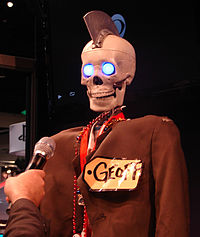Guy Ritchie's latest addition to the Holmesian cinematic canon, "Sherlock Holmes: A Game of Shadows," has done fairly well at box offices in what Hollywood is describing as a generally disappointing year for movie attendance. As of this writing, the film's combined domestic and foreign ticket sales since its opening last December 16th is approaching $80 million.
So a lot of people are seeing this movie. And a lot of people, professional movie critics and otherwise, are talking about it. What fascinates me most about reaction to the new Holmes film are the countless reviews and comments I've encountered accusing Ritchie's (and actor Robert Downey, Jr.'s) interpretation of the iconic Sherlock Holmes character of being untrue to the vision of the great detective's creator, Sir Arthur Conan Doyle. Typical of this reaction is Washington Post reviewer Mark Jenkins' criticism that Ritchie's film "owes more to Ian Fleming or Marvel Comics than to Conan Doyle's drawing room mysteries." Jenkins complains that Downey "plays Holmes as brainy yet highly physical," which seemingly strikes Jenkins as an affront to Holmesian orthodoxy because, "[a]s originally conceived, Holmes was a reflective sort..." I've talked with many folks who share Jenkins' disapproval of Ritchie's and Downey's sinewy portrayal of Holmes as an abomination of Conan Doyle's supposedly far gentler creation.
Let's explore that.
Over the course of four novels and 56 short stories published between 1887 and 1927 (all of which I've read), Holmes repeatedly demonstrates awesome talents in a wide array of deadly proficiencies. He carries a pistol, and he's an excellent shot. In addition to being an expert swordsman, he disables villains with sticks, canes, and riding crops. He's a highly skilled bare-knuckle fighter, a trained boxer, and a master of the Bartitsu martial arts. Physically, "[f]ew men were capable of greater greater muscular effort," Dr. Watson says of his companion. Accordingly, anyone even passingly familiar with Conan Doyle's stories knows Holmes never shies from a fight, and is always the clear winner in every instance of the many and brutal hand-to-hand battles he undertakes in the course of his detections.
Nor does Holmes merely sit around in his flat in London's Baker Street and solve mysteries solely through exercising his remarkable intelligence after digesting facts he's told as he lolls in the comfort of his drawing room. Instead, he travels extensively throughout England and to exotic European locales to capture felons and upend their monstrous criminal (and frequently political) conspiracies. He does so at the requests of private citizens, and the British government, usually working alone while warding off the deleterious effects of his fondness for cocaine.
Ian Fleming was born in the posh Mayfair neighborhood of London in 1908. As the son of a wealthy Member of Parliament, he enjoyed a first-class education in some of England's finest schools. He was extremely well-read, and following the conclusion of World War II began to seriously pursue his lifelong ambition of being a published author. Given his background and upbringing, it's inconceivable that growing up in England in the first half of the 20th century Fleming didn't read (if not devour) Conan Doyle's Holmes stories.
Fleming's James Bond debuted in the 1953 novel, Casino Royale. Over the course of 12 novels and nine short stories published between 1953 and 1966 (all of which I've read), not to mention 22 Bond films released between 1962 and 2008 (all of which I've seen), we've come to know James Bond well. He's a lone-wolf agent of the British government who travels the globe on behalf of Her Majesty's Government to derail nefarious plots through a combination of his keen intelligence, physical prowess, and mastery of all manners of weapons, all the while warding off the deleterious effects of his fondness for alcohol.
Sound familiar?
I know there were many real people who influenced the creation of James Bond. Fleming once said Bond "was a compound of all the secret agents and commando types [Fleming] met during the war."
But there was also someone fictional who profoundly impacted the birth of James Bond. Sherlock Holmes was the first literary super-spy, if you will, and his influence on the Bond mythos is patent and unavoidable.
Mark Jenkins says Ritchie's and Downey's Sherlock Holmes is derivative of James Bond, and a misguided depiction of Conan Doyle's seminal contribution to detective fiction.
Jenkins and his ilk couldn't be more mistaken. Ritchie's and Downey's two movies hew far closer to Conan Doyle's vision than any of the more than 200 Holmes films that preceded them (most of which I've seen). And if either character is derivative in any medium, it's James Bond who owes a debt to Sherlock Holmes, not vice-versa.
Incidentally, I saw "Sherlock Holmes: A Game of Shadows" a couple days ago. It's really entertaining.
I'm confident Sir Arthur would have loved it.
"It is a capital mistake to theorize before you have all the evidence. It biases the judgement."
~~ Sherlock Holmes (from A Study in Scarlet, 1887) ~~






